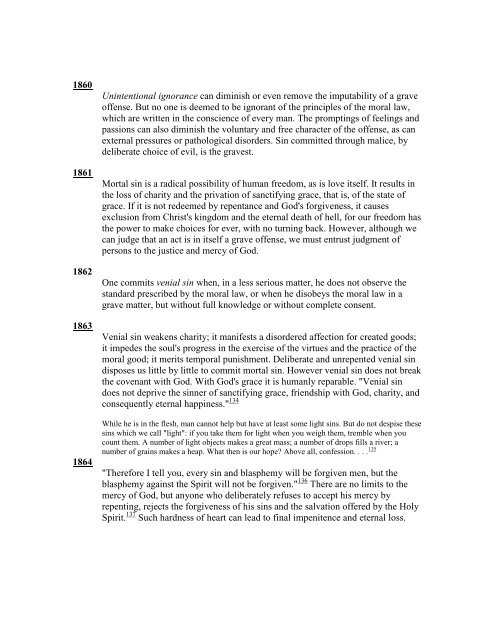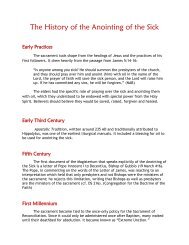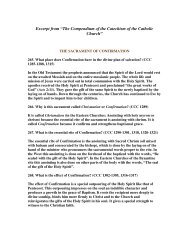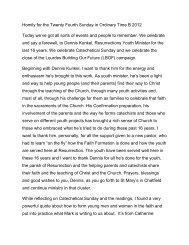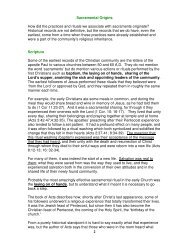Catechism of the Catholic Church IV. The Gravity of Sin: Mortal and ...
Catechism of the Catholic Church IV. The Gravity of Sin: Mortal and ...
Catechism of the Catholic Church IV. The Gravity of Sin: Mortal and ...
Create successful ePaper yourself
Turn your PDF publications into a flip-book with our unique Google optimized e-Paper software.
1860<br />
1861<br />
1862<br />
1863<br />
1864<br />
Unintentional ignorance can diminish or even remove <strong>the</strong> imputability <strong>of</strong> a grave<br />
<strong>of</strong>fense. But no one is deemed to be ignorant <strong>of</strong> <strong>the</strong> principles <strong>of</strong> <strong>the</strong> moral law,<br />
which are written in <strong>the</strong> conscience <strong>of</strong> every man. <strong>The</strong> promptings <strong>of</strong> feelings <strong>and</strong><br />
passions can also diminish <strong>the</strong> voluntary <strong>and</strong> free character <strong>of</strong> <strong>the</strong> <strong>of</strong>fense, as can<br />
external pressures or pathological disorders. <strong>Sin</strong> committed through malice, by<br />
deliberate choice <strong>of</strong> evil, is <strong>the</strong> gravest.<br />
<strong>Mortal</strong> sin is a radical possibility <strong>of</strong> human freedom, as is love itself. It results in<br />
<strong>the</strong> loss <strong>of</strong> charity <strong>and</strong> <strong>the</strong> privation <strong>of</strong> sanctifying grace, that is, <strong>of</strong> <strong>the</strong> state <strong>of</strong><br />
grace. If it is not redeemed by repentance <strong>and</strong> God's forgiveness, it causes<br />
exclusion from Christ's kingdom <strong>and</strong> <strong>the</strong> eternal death <strong>of</strong> hell, for our freedom has<br />
<strong>the</strong> power to make choices for ever, with no turning back. However, although we<br />
can judge that an act is in itself a grave <strong>of</strong>fense, we must entrust judgment <strong>of</strong><br />
persons to <strong>the</strong> justice <strong>and</strong> mercy <strong>of</strong> God.<br />
One commits venial sin when, in a less serious matter, he does not observe <strong>the</strong><br />
st<strong>and</strong>ard prescribed by <strong>the</strong> moral law, or when he disobeys <strong>the</strong> moral law in a<br />
grave matter, but without full knowledge or without complete consent.<br />
Venial sin weakens charity; it manifests a disordered affection for created goods;<br />
it impedes <strong>the</strong> soul's progress in <strong>the</strong> exercise <strong>of</strong> <strong>the</strong> virtues <strong>and</strong> <strong>the</strong> practice <strong>of</strong> <strong>the</strong><br />
moral good; it merits temporal punishment. Deliberate <strong>and</strong> unrepented venial sin<br />
disposes us little by little to commit mortal sin. However venial sin does not break<br />
<strong>the</strong> covenant with God. With God's grace it is humanly reparable. "Venial sin<br />
does not deprive <strong>the</strong> sinner <strong>of</strong> sanctifying grace, friendship with God, charity, <strong>and</strong><br />
consequently eternal happiness." 134<br />
While he is in <strong>the</strong> flesh, man cannot help but have at least some light sins. But do not despise <strong>the</strong>se<br />
sins which we call "light": if you take <strong>the</strong>m for light when you weigh <strong>the</strong>m, tremble when you<br />
count <strong>the</strong>m. A number <strong>of</strong> light objects makes a great mass; a number <strong>of</strong> drops fills a river; a<br />
number <strong>of</strong> grains makes a heap. What <strong>the</strong>n is our hope? Above all, confession. . . . 135<br />
"<strong>The</strong>refore I tell you, every sin <strong>and</strong> blasphemy will be forgiven men, but <strong>the</strong><br />
blasphemy against <strong>the</strong> Spirit will not be forgiven." 136 <strong>The</strong>re are no limits to <strong>the</strong><br />
mercy <strong>of</strong> God, but anyone who deliberately refuses to accept his mercy by<br />
repenting, rejects <strong>the</strong> forgiveness <strong>of</strong> his sins <strong>and</strong> <strong>the</strong> salvation <strong>of</strong>fered by <strong>the</strong> Holy<br />
Spirit. 137 Such hardness <strong>of</strong> heart can lead to final impenitence <strong>and</strong> eternal loss.


